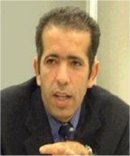|
Plenary
Lecture
Formal and Automatic Enforcement of
Security by Rewriting

Professor Mohamed Mejri
Departement d'Informatique et de Genie Logiciel
Universite Laval, Quebec (QC) Canada
E-mail:
mohamed.mejri@ift.ulaval.ca
Abstract: The literature
records various formal and
automatic techniques allowing to
ensure that a system never violate
some given requirements ans in
particular some security policies.
Mainly, we distinguish two groups
of approaches: static analysis and
dynamic analysis. Static analysis
aims to verify software before
running them while dynamic
analysis techniques check them
during their executions.
Generally, both of these
techniques are needed since they
complement each other: There are
some properties that could not be
verified dynamically and
vice-versa. For instance, liveness
properties (something good will
happen) could not be ensured
dynamically. Other properties that
depend on some values known only
at execution time could not be
verified statically. However,
static analysis are in most all
cases preferable when the problem
can be resolved before the
execution.
Recently, many researchers have
been interested by rewriting
techniques in order to gather
advantages of both static and
dynamic methods. The idea consists
in modifying statically a
software, so that the new version
respects the requested
requirements. The rewritten
software is generated from the
original one by adding, when
necessary, some tests at some
critical points so that it behaves
like requested.
Brief Biography of the Speaker:
He received a Ph.D. in Computer
Science with General Honors,
Computer Science Department, Laval
University, Canada.
Currently he is a Full Professor
in Computer Science. Computer
Science Department, Laval
University, Quebec, Canada, he
works on computer Security, and
contributed in many project
worldwide.
He received CIPA Awards/Canadian
Information Productivity
Awards/2001: MaliCots project
(LSFM research group). CIPA'2001.
He received Star Professor/Laval
University, Canada 2002/ 2003/
2005/ 2006/ 2008: For the
excellent quality of teaching. He
was a visiting professor at
Fujita's Laboratory Iwate
Prefectural University, Iwate,
Japan on 2008, for six months
doing a joint work with Prof.
Hamido Fujita, He got a joint
patent on software methodology.
|
